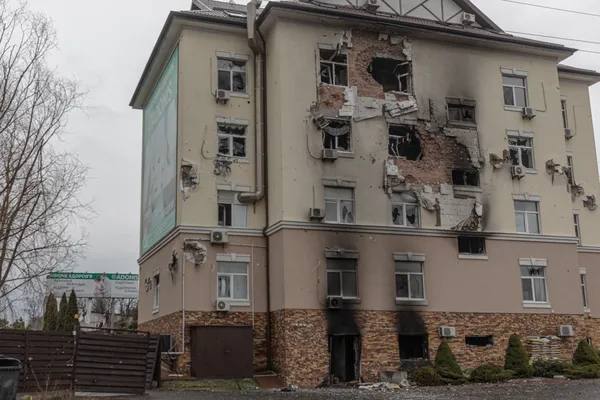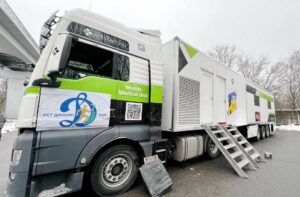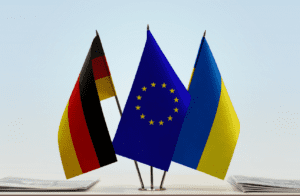
ADONIS Medical Group has become a member of the ONOVA Ukraine Recovery Project.
According to the medical group, the joint project of ONOVA and the ADONIS Medical Group provides, in particular, for the restoration of the ADONIS maternity hospital in Buzova (Kyiv region), which was seriously damaged by an aggressor missile on February 28, 2022.

The Adonis network has eight branches in Kyiv and the region, providing services in more than 65 medical areas. During the war, the branches with surgical units continue to help patients by providing quality medical care to military and civilians.
The ONOVA League of Renewal of Ukraine is a platform for uniting and interacting with representatives of various fields of activity to restore and renew Ukraine.

Investment company Concorde Capital, which acquired the plant “Kuznya na Rybalskogo” at the end of 2022, is developing the concept of a new development project on the territory of the plant, said the head of Concorde Capital Igor Mazepa in a commentary to the publication “Economic Pravda”.
According to Mazepa, the concept is being developed jointly with foreign architectural agencies. The businessman expects to start construction after the completion of legal proceedings around the bankruptcy of “Kuzna na Rybalskogo”.
He also indicated that Concorde Capital is considering participation in joint investment in the project.
“Our initial plan was to attract an investor to resell the project. Now the situation has changed, so we do not rule out participation in joint investment,” Mazepa said.
He did not disclose the amount of the deal to acquire the plant “Kuznya na Rybalskogo”, previously owned by Sergei Tihipko, but indicated that the deal included assets encumbered by debts of the owner company Ewins Limited.
As reported, in the fall of 2018, co-owner of the TAS Group, businessman Sergei Tihipko acquired from Petro Poroshenko, at that time the President of Ukraine, PJSC “Plant “Kuznya na Rybalskoe” (formerly – PJSC “Leninskaya Kuznya”) – one of the well-known in the market of shipbuilding enterprises of Ukraine.
Until mid-November 2018, the main shareholder of PJSC “ZNKIF “Prime Assets Capital” (formerly – “Petro Poroshenko Fund”, Kiev) was the main shareholder with a 73.9067% stake in the shipyard privatized in 1995, the second largest shareholder with a 20.1280% stake was PJSC “ZNKIF “VIK”, which concentrated the assets of MP Igor Kononenko.
In December 2022, the Economic Court of Kyiv opened a bankruptcy case against PJSC “Plant “Kuznya na Rybalskogo” (Kyiv).
As reported, the TAS group planned to realize on the unused territory of the plant the Lipki Island City Resort project in partnership with the developer City One Development.
According to the National Commission on Securities and Stock Market, as of the second quarter of 2023, the main shareholder of Zavod Kuznya na Rybalskoe is Ewins Limited (94.0347%).

The mayor of Irpen, Buchanskiy district of Kyiv region Oleksandr Markushin reported on the possible introduction of innovative technology of garbage recycling in the community.
“Japanese company Padeco will conduct research in Irpen community in the framework of the pilot project on recycling of garbage URBAN RIG. Technology offer innovative – to process household waste in a special apparatus with the help of high-temperature steam. The output promises useful raw materials for industry and a significant reduction in the volume of waste. Organics will be turned into coal, plastic into petroleum products,” he said in his Telegram channel on Thursday.
In addition to household garbage, this technology can also help with recycling and reducing the volume of construction waste, particularly concrete.
He specified that Padeco is an international consulting company authorized by the Ministry of Economy of Japan to select and analyze projects for financing in Ukraine.
The study to determine whether the proposed technology is suitable for Ukrainian realities will take three months.
“If everything goes well and the Japanese government allocates funding – Irpin community will be able to receive the first trial machines for environmental cleaning in the spring,” Markushin said.

The state enterprise “Forests of Ukraine” is launching a project to create a system of personnel reserve, said the company’s CEO Yuriy Bolokhovets.
“Forests of Ukraine employs more than 30 thousand people in all regions of the country. Thousands of management positions. Recently, we have been actively getting rid of managers who commit abuses or violations (…) But where and how to find the best personnel? (…) That’s why we are creating a system of personnel reserve,” he wrote on Facebook.
According to Bolokhovets, the reserve should open up growth opportunities for the capable and hardworking. Every employee who wants to take part in the competition can apply, be tested and undergo a comprehensive assessment of knowledge and skills. Once a vacancy is opened, the HR committee will conduct a selection process, taking into account candidates from the reserve. Employees who are selected for the personnel reserve will be given the opportunity to improve their skills at training courses in law, management, psychology, IT, etc.
The Director General of the State Enterprise “Forests of Ukraine” expressed hope that the new system of candidate evaluation will be not only objective, but also transparent with the possibility of public control.
Currently, the talent pool system is being finalized, a list of positions is being formed, and tests covering all aspects of the company’s work are being developed. The reserve for three positions has already been launched in a pilot mode: a forester, a branch director, and a deputy director of a regional office.
The state enterprise expects that the reserve will start working next year. And all appointments to senior positions will be made exclusively on a competitive basis.
As reported, Ukraine launched a forestry reform in 2016. As part of it, the sale of raw wood at electronic auctions has already been introduced. Since 2021, an interactive map of wood processing facilities has been operating in a test mode in a number of regions.
The industry has implemented the Forest in a Smartphone project, which contains a list of logging tickets for timber harvesting and allows you to check the legality of logging on the agency’s online map.
On June 1, 2023, Ukraine launched a pilot for the electronic issuance of logging tickets and certificates of origin of timber. In addition, the State Enterprise “Forests of Ukraine” has launched a pilot project to procure timber harvesting services through the Prozorro electronic platform.
To date, the SFE has harvested more than 130 thousand cubic meters of firewood for the 2023/2024 heating season.

Swiss pharmaceutical company Acino became a partner of the project “Mobile hospitals for Victory” implemented by Charitable Foundation for Reconstruction and Development of Ukraine.
According to the press release from the Foundation, within the framework of this project Acino shipped to the pilot mobile medical complex 1600 packages of drugs from its own product portfolio for the total amount of UAH 150 thousand.
The “Mobile Hospitals for Victory” project provides for purchasing 52 mobile hospitals. The cost of one such medical complex on wheels is EUR 240 thousand.
Currently 14 organizations in Ukraine and abroad have joined the project.
Mobile hospital is a complete hospital on wheels equipped with modern medical equipment. It consists of an admission room, a laboratory, an X-ray room, an operation room and also technical rooms, toilets and showers. The hospital is equipped with its own generator. Two medical teams can work there at the same time, with the ability to save up to 100 lives a day, based on the “golden hour” principle.
Since the beginning of Russia’s full-scale invasion of Ukraine on February 24, 2022, the Acino pharmaceutical company has donated more than 67 million UAH for humanitarian purposes, including over 200 thousand packages of medicines to hospitals and hospitals in the country.

Germany has joined an international project to restore Ukrainian cities #UN4Kharkiv-Mykolaiv and allocated EUR5 million.
As it was informed, the UN Economic Commission for Europe (UNECE) has created working groups #UN4Kharkiv and #UN4Mykolaiv and invited international architects to help these cities develop future master plans. The British architect Norman Foster Foundation helps Kharkiv, while the global design and architectural company One Works (Italy) coordinates the work in Nikolaev.
It became known about the German side joining the projects during the online meeting of the working groups, which was attended by representatives of the Ministry of Community Development, Territories and Infrastructure of Ukraine, UNECE, the Federal Ministry of Economic Cooperation and Development of Germany, local governments of Mykolaiv and Kharkiv and other international organizations.
“Since the beginning of Russia’s full-scale aggression, we have been sending the most necessary aid to Ukraine. And at the same time we are thinking about how to support you in rebuilding after the end of the war, because it is necessary to prepare for this now. I personally received a task from the German Federal Chancellor Olaf Scholz to represent our country in this work,” said State Secretary of the Federal Ministry for Economic Cooperation and Development Jochen Flasbart.
He recalled that the G7 countries met last December, during which the member states expressed their understanding that Ukraine needed comprehensive assistance.
Flasbat said that the German Federal Ministry for Economic Cooperation and Development will provide the international project #UN4Kharkiv-Mykolaiv with financial support of EUR5 million.
“We are giving the “green light” and preparing funds so that these projects can be successfully implemented. We hope that the terrible war will end as soon as possible, and we will start rebuilding Ukraine,” Jochen Flasbarth makes plans for the future.